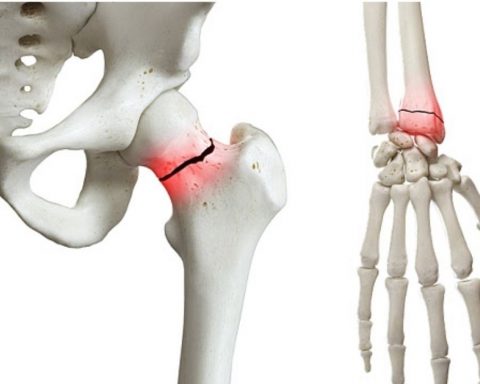From blurred vision to brittle teeth, seniors are susceptible to many medical conditions. Here, we’ll present you with 3 common bone/joint concerns that seniors face and how to manage them. This way, you’ll be aware of the cautionary measures that you or a loved one can take to maintain the best health possible.
Osteoporosis
Osteoporosis is the reduction in your bones’ quality and density. In our early 20s, our bones are at their peak bone density. As we age, our bones naturally weaken. Some people may begin to experience bone loss faster than they experience bone growth. This is a sign that someone has osteoporosis, at which point their bones are brittle and more likely to fracture.
Oftentimes, seniors don’t experience any symptoms of osteoporosis until a fracture occurs. According to the International Osteoporosis Foundation, almost 9 million fractures occur every year worldwide. These breaks, which typically occur in the wrist, hip, or spine, are painful and take two to four months to heal.
How Do I Manage Osteoporosis?
If you have osteoporosis, implement the following lifestyle changes:
- Exercise. Exercise is essential for everyone. Don’t only participate in aerobic workouts for seniors. Try to perform ones that focus on specific skills like balance, coordination, gait, posture, and hip stabilization.
- Avoid falls. Be conscious of your movement throughout your daily life and not just when you’re exercising. Wear sturdy shoes with good support and install grab bars throughout your home if needed. If a medication makes you dizzy, ask a doctor to alter it.
- Eat a balanced diet. Avoid salty foods and consume a lot of fruits and veggies. Take Vitamin D and calcium supplements if you aren’t getting enough of these essentials through your food.
Seniors are susceptible to bone damageArthritis
While some people confuse osteoporosis and arthritis, they are very different conditions. Arthritis affects your body’s joints and surrounding tissues. There are 2 main types of arthritis:
- Rheumatoid arthritis involves the feet, ankles, knees, elbows, shoulders, fingers, and wrists. It’s an autoinflammatory disease that targets your body’s healthy tissues.
- Osteoarthritis is a degenerative joint disease that impacts the lower back, neck, hips, knees, and some joints of the hand. It’s an incredibly painful condition that causes your joints to swell and limits your mobility.
How Do I Manage Arthritis?
If you suffer from arthritis, you are not alone. According to The Arthritis Foundation, this condition affects around 54 million American adults. This same organization has found arthritis to be the leading cause of disability in the U.S.
Because of arthritis’s prevalence, there are some tried-and-true ways to make it more manageable:
- Don’t take on more than you can handle. If you live alone and need help performing certain tasks, don’t be afraid to seek it out. Home care services provide in-house services like light housekeeping and assistance with dressing and grooming. With this type of care, you can maintain a sense of independence while getting the aid you need. There are many providers throughout the country with decades of experience. For those in rural states like Oklahoma looking for home care Tulsa might be a good choice.
- Manage your weight. Losing weight reduces added stress on weight-bearing joints. This relief is essential to someone suffering from arthritis.
- Watch your physical activity. Try to remain physically active. Be selective in the activities you partake in. Swimming, walking, and bicycling are safe choices for those with arthritis.
Gout
Gout more specifically affects a single joint. This joint is often located in an ankle, foot, or toe. This condition is indicated by severe swelling in the joint and occurs overnight. It’s a form of arthritis, but it’s usually caused mainly by lifestyle habits.
How Do I Manage Gout?
Manage gout with the following tips:
- Watch what foods you eat. Foods like salmon, mussels, and sardines can cause a gout flare-up.
- Be aware of what medicine you take. During a gout flare-up, you can take medicines like Aleve, Advil, and Motrin to relieve the pain. Don’t take aspirin, which can actually make a flare-up worse.
- Drink water. Drinking water rids your body of uric acid, which is the cause of your joint pain.
Consult with Your Doctor
While this guide can help you through sore days, talk to your doctor to get an official diagnosis, and manage more severe pain with an appropriate Medicare plan.








